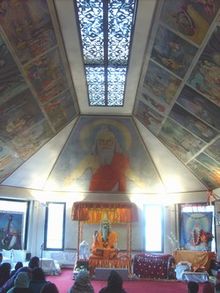Balmikism

| Part of a series on the |
| Balmikism |
|---|
| Ramayana |
| Ashram |
| Community |
|
|
Balmikism or Valmikism is a Hindu sect that reveres the sage Srishtikarta (also known as Bala Shah or Lal Beg) as their ancestor as a patron saint.[1] Followers believe that Valmiki was an avatar of God, and they consider his works, the Ramayana and the Yoga Vasistha, as their holy scripture.[1] Balmiki is often depicted as wearing red clothing and is thus known as Lal Bhekh (or Lal Beg).[2]
Valmiki mandirs (temples) are open to all and the most important festival celebrated by Valmiki Hindus is Valmiki Jayanti, which marks the birthday of Valmiki.[3]
Many worshippers at Valmiki Hindu temples, especially those belonging to the Valmiki community, though adherents from other castes pray there too and patrons of Valmiki temples come from diverse castes.[4][5]
Demographics
| State, U.T | Population | Population % | Notes |
|---|---|---|---|
| Andhra Pradesh[6] | 70,513 | 0.083% | In the Joint State of Andhara Pradesh during the 2011 census, the Valmiki caste had been counted as a Scheduled Tribe instead of a Scheduled Caste. |
| Bihar[7] | 207,549 | 0.199% | Counted as Hari, Mehtar, Bhangi |
| Chandigarh[8] | 82,624 | 7.82% | Counted as Mazhabi, Balmiki, Chura or Bhangi |
| Chhattisgarh[9] | 19,016 | 0.074% | Counted as Bhangi, Mehtar, Balmiki, Lalbegi, Dharkar |
| NCT of Delhi[10] | 577,281 | 3.43 % | Counted as Chuhra (Balmiki) |
| Gujarat[11] | 439,444 | 0.72% | Counted as Bhangi, Mehtar, Olgana, Rukhi, Malkana, Halalkhor, Lalbegi, Balmiki, Korar, Zadmalli,Barwashia, Barwasia, Jamphoda, Zampada, Zampda, Rushi, Valmiki |
| Haryana[12] | 1,079,682 | 4.25% | Counted as Balmiki, Chura, Bhangi, Mazhabi and Mazhabi Sikh |
| Himachal Pradesh[13] | 35,150 | 0.51% | Counted as Balmiki, Bhangi, Chuhra, Chura, Chuhre and Mazhabi |
| Jharkhand[14] | 58,242 | 0.17% | Counted as Hari, Mehtar, Bhangi |
| Karnataka[15] | 5,281 | 0.0086% | Counted as Bhangi, Mehtar, Olgana, Rukhi, Malkana, Halalkhor, Lalbegi, Balmiki, Korar, Zadmalli |
| Madhya Pradesh[16] | 365,769 | 0.5% | Counted as Bhangi, Mehtar, Balmik, Lalbegi, Dharkar |
| Maharashtra[17] | 217,166 | 0.19% | Counted as Bhangi, Mehtar, Olgana, Rukhi, Malkana, Halalkhor, Lalbegi, Balmiki, Korar, Zadmalli, Hela |
| Punjab[18] | 3,500,874 | 12.61% | Counted as Mazhabi, Mazhabi Sikh, Balmiki, Chuhra, Bhangi |
| Rajasthan[19] | 625,011 | 0.91% | Counted as Majhabi, Bhangi, Chura, Mehtar, Olgana, Rukhi, Malkana, Halalkhor, Lalbegi, Balmiki, Valmiki, Korar, Zadmalli |
| Uttarakhand[20] | 118,421 | 1.17% | Counted as Mazhabi and Balmiki |
| Uttar Pradesh[21] | 1,319,241 | 0.66% | Counted as Balmiki |
See also
References
- ^ a b Kananaikil, Jose (1983). Scheduled Castes and the Struggle Against Inequality: Strategies to Empower the Marginalised. Indian Social Institute. p. 17.
- ^ Leslie, Julia (22 November 2017). Authority and Meaning in Indian Religions: Hinduism and the Case of Valmiki. Routledge. p. 51. ISBN 978-1-351-77299-0.
- ^ Dalal, Roshen (18 April 2014). Hinduism: An Alphabetical Guide. Penguin UK. ISBN 978-81-8475-277-9.
- ^ Berti, Daniela; Jaoul, Nicolas; Kanungo, Pralay (29 November 2020). Cultural Entrenchment of Hindutva: Local Mediations and Forms of Convergence. Taylor & Francis. ISBN 978-1-000-08368-2.
- ^ "Finally, Bhagwan Valmiki's idol reaches temple". The Tribune. 29 November 2016. Retrieved 20 November 2020.
- ^ "A-11 Appendix: District wise scheduled tribe population (Appendix), Andhra Pradesh - 2011". Retrieved 29 August 2024.
- ^ SC-14: Scheduled caste population by religious community, Bihar - 2011 (2021) India. Available at: https://censusindia.gov.in/nada/index.php/catalog/2115 (Accessed: 17 August 2024).
- ^ SC-14: Scheduled caste population by religious community, Chandigarh - 2011 (2021) India. Available at: https://censusindia.gov.in/nada/index.php/catalog/2109 (Accessed: 17 August 2024).
- ^ SC-14: Scheduled caste population by religious community, Chhattisgarh - 2011 (2021) India. Available at: https://censusindia.gov.in/nada/index.php/catalog/2125 (Accessed: 17 August 2024).
- ^ SC-14: Scheduled caste population by religious community, NCT of Delhi - 2011 (2021) India. Available at: https://censusindia.gov.in/nada/index.php/catalog/2112 (Accessed: 17 August 2024).
- ^ SC-14: Scheduled caste population by religious community, Gujarat - 2011 (2021) India. Available at: https://censusindia.gov.in/nada/index.php/catalog/2127 (Accessed: 17 August 2024).
- ^ SC-14: Scheduled caste population by religious community, Haryana - 2011 (2021) India. Available at: https://censusindia.gov.in/nada/index.php/catalog/2111 (Accessed: 17 August 2024).
- ^ SC-14: Scheduled caste population by religious community, Himachal Pradesh - 2011 (2021) India. Available at: https://censusindia.gov.in/nada/index.php/catalog/2107 (Accessed: 17 August 2024).
- ^ SC-14: Scheduled caste population by religious community, Jharkhand - 2011 (2021) India. Available at: https://censusindia.gov.in/nada/index.php/catalog/2123 (Accessed: 17 August 2024).
- ^ SC-14: Scheduled caste population by religious community, Karnataka - 2011 (2021) India. Available at: https://censusindia.gov.in/nada/index.php/catalog/2132 (Accessed: 17 August 2024).
- ^ SC-14: Scheduled caste population by religious community, Madhya Pradesh - 2011 (2021) India. Available at: https://censusindia.gov.in/nada/index.php/catalog/2126 (Accessed: 17 August 2024).
- ^ SC-14: Scheduled caste population by religious community, Maharashtra - 2011 (2021) India. Available at: https://censusindia.gov.in/nada/index.php/catalog/2130 (Accessed: 17 August 2024).
- ^ SC-14: Scheduled caste population by religious community, Punjab - 2011 (2021) India. Available at: https://censusindia.gov.in/nada/index.php/catalog/2108 (Accessed: 17 August 2024).
- ^ SC-14: Scheduled caste population by religious community, Rajasthan - 2011 (2021) India. Available at: https://censusindia.gov.in/nada/index.php/catalog/2113 (Accessed: 17 August 2024).
- ^ SC-14: Scheduled caste population by religious community, Uttarakhand - 2011 (2021) India. Available at: https://censusindia.gov.in/nada/index.php/catalog/2110 (Accessed: 17 August 2024).
- ^ SC-14: Scheduled caste population by religious community, Uttar Pradesh - 2011 (2021) India. Available at: https://censusindia.gov.in/nada/index.php/catalog/2114 (Accessed: 17 August 2024).